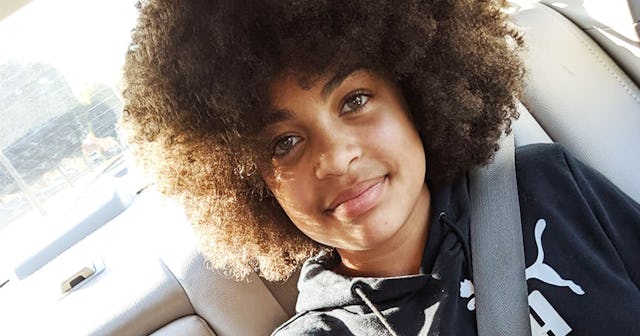When Her Tween Daughter Was Teased For Her Natural Hair, This Mom Wasn't Having It

Audrey Carter is a tween, described by her mom as happy, kind, friendly, inclusive, and silly. But when Audrey—who is in fifth grade–wore her natural hair to school, she was met with anything but kindness.
Audrey’s mom, Adelle Carter, posted a photo of her daughter on Facebook—sharing her peers’ response to Audrey’s hairstyle. Adelle reported that Audrey was teased throughout the day by several kids who chose to refer to Audrey as “fro” instead of her name.
She added that kids asked Audrey why she didn’t “put all that under her hood” and asked her why her hair is “so big.” Others asked her “what happened to her hair” and “why does it look like this?”
Audrey wasn’t having it. Her teacher reported to Adelle that Audrey “handled the situation beautifully.” Audrey told her classmates that “her name is Audrey” and not “Fro,” and no one should call her anything but her name. She also told her peers that her hair is beautiful and she loves it.
Adelle said she didn’t have time to pull Audrey’s hair back that morning in the way that Audrey prefers. When she dropped Audrey off at school that morning, she “prayed she wouldn’t have an issue.” We can all certainly empathize with Adelle. School mornings can be incredibly chaotic and rushed.
Audrey certainly isn’t the first person of color—or the last—to be harassed because of her natural hair.
For years, black people have dealt with white people touching their hair—a racial microaggression. As a mom of four black children, we have had numerous white people claim that they are curious and reach out to touch my girls’ cornrows or fondle the beads that secure the ends.
It’s completely inappropriate for a stranger to touch a child’s hair, and the white privilege exhibited by adults is disturbing. My kids aren’t pets. They are people. And of course, some of these white adults are parents who teach their white children—by example or in word—not to appreciate and understand hair diversity and personal space.
Over the past several years, school and workplace discriminatory hair policies have gone viral. Such policies have banned extensions, afros, and hair that’s over a certain height. Such policies target black people, including those who choose to wear protective hairstyles such as cornrows.
Last winter, Andrew Johnson—a high school wrestler—was told by a white referee to cut his dreadlocks immediately or forfeit the match. The ref claimed that Johnson’s locs violated code. A viral video shows a white female cutting Johnson’s locs. Later, information emerged that the referee had previously referred to a colleague as the N-word, establishing that the ref had initiated another racist incident in the past.
This year, California became the first state to ban discriminatory hair policies in work places. In the past, employers could demand “professional” hairstyles of their employees. This gave employers a free pass to police women of color who chose to wear their hair in a natural state—including locs, twists, braids, and Audrey’s hairstyle—an afro.
Luckily Audrey wasn’t the only one to stand up for herself and her beautiful hair. Her teacher said that parents would be contacted and she would have a long discussion with the students.
Adelle implored those reading her post to talk to their children about hair diversity. “I think because I have these conversations with Audrey, she was able to react the way she did. She knows those comments come from ignorance and she’s here to educate. I’m proud of my baby.”
Since the incident, Adelle has posted videos of Audrey delivering motivational messages. She’s also shared a video that my own four kids love, Sesame’s Street’s I Love My Hair—a video of a black girl puppet expressing the various ways she can wear her natural hair.
Because Black children are so often targeted for their hairstyles and hair type—and of course, their melanin–parents of these children (myself included) work relentlessly to instill racial pride in our kids. I teach my children that their hair is their crown, that white people never have the right to touch their hair, and that their hair is versatile and amazing. My kids have daily morning affirmations where we instill in them that their blackness is a gift to be celebrated and honored.
It seems no black child is immune. Lonnie Chavez, who plays young Randall on This Is Us, shut down haters last year when he addressed the comments he’d received about the gap in his front teeth. He addressed the judgmental comments on Instagram, acknowledging his tooth gap and that he could fix it with braces if he chose to. However, he clapped back to trolls saying, “Fix your heart!” Followed by, “To all those being bullied or being trolled, YOU ARE BEAUTIFUL, YOU ARE AWESOME, and YOU MATTER.”
Adelle told Scary Mommy that she’s taught her daughter to be proud of who she is: “We teach her about positive and successful people that look like her. We teacher her about people from history who paved the way for her to be here today.”
Good job, mama. Because Audrey isn’t having the hate. And in fact, is choosing to spread positivity like the queen she is.
This article was originally published on